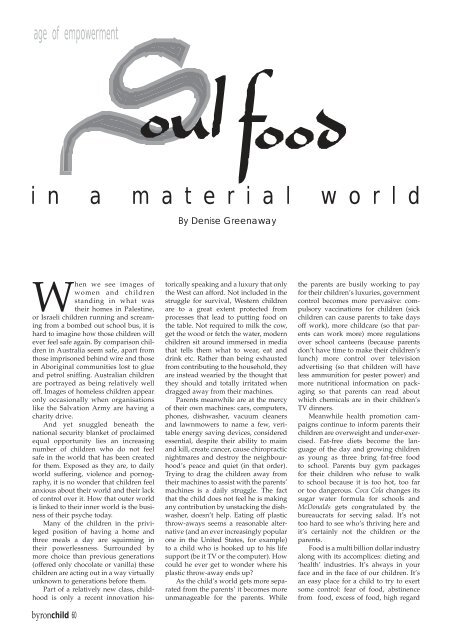byronchild - logo
byronchild - logo
byronchild - logo
Create successful ePaper yourself
Turn your PDF publications into a flip-book with our unique Google optimized e-Paper software.
S<br />
age of Sp empowerment<br />
oulfood in a material world<br />
When we see images of<br />
women and children<br />
standing in what was<br />
their homes in Palestine,<br />
or Israeli children running and screaming<br />
from a bombed out school bus, it is<br />
hard to imagine how those children will<br />
ever feel safe again. By comparison children<br />
in Australia seem safe, apart from<br />
those imprisoned behind wire and those<br />
in Aboriginal communities lost to glue<br />
and petrol sniffing. Australian children<br />
are portrayed as being relatively well<br />
off. Images of homeless children appear<br />
only occasionally when organisations<br />
like the Salvation Army are having a<br />
charity drive.<br />
And yet snuggled beneath the<br />
national security blanket of proclaimed<br />
equal opportunity lies an increasing<br />
number of children who do not feel<br />
safe in the world that has been created<br />
for them. Exposed as they are, to daily<br />
world suffering, violence and pornography,<br />
it is no wonder that children feel<br />
anxious about their world and their lack<br />
of control over it. How that outer world<br />
is linked to their inner world is the business<br />
of their psyche today.<br />
Many of the children in the privileged<br />
position of having a home and<br />
three meals a day are squirming in<br />
their powerlessness. Surrounded by<br />
more choice than previous generations<br />
(offered only chocolate or vanilla) these<br />
children are acting out in a way virtually<br />
unknown to generations before them.<br />
Part of a relatively new class, childhood<br />
is only a recent innovation his-<br />
<strong>byronchild</strong> 60<br />
By Denise Greenaway<br />
torically speaking and a luxury that only<br />
the West can afford. Not included in the<br />
struggle for survival, Western children<br />
are to a great extent protected from<br />
processes that lead to putting food on<br />
the table. Not required to milk the cow,<br />
get the wood or fetch the water, modern<br />
children sit around immersed in media<br />
that tells them what to wear, eat and<br />
drink etc. Rather than being exhausted<br />
from contributing to the household, they<br />
are instead wearied by the thought that<br />
they should and totally irritated when<br />
dragged away from their machines.<br />
Parents meanwhile are at the mercy<br />
of their own machines: cars, computers,<br />
phones, dishwasher, vacuum cleaners<br />
and lawnmowers to name a few, veritable<br />
energy saving devices, considered<br />
essential, despite their ability to maim<br />
and kill, create cancer, cause chiropractic<br />
nightmares and destroy the neighbourhood’s<br />
peace and quiet (in that order).<br />
Trying to drag the children away from<br />
their machines to assist with the parents’<br />
machines is a daily struggle. The fact<br />
that the child does not feel he is making<br />
any contribution by unstacking the dishwasher,<br />
doesn’t help. Eating off plastic<br />
throw-aways seems a reasonable alternative<br />
(and an ever increasingly popular<br />
one in the United States, for example)<br />
to a child who is hooked up to his life<br />
support (be it TV or the computer). How<br />
could he ever get to wonder where his<br />
plastic throw-away ends up?<br />
As the child’s world gets more separated<br />
from the parents’ it becomes more<br />
unmanageable for the parents. While<br />
the parents are busily working to pay<br />
for their children’s luxuries, government<br />
control becomes more pervasive: compulsory<br />
vaccinations for children (sick<br />
children can cause parents to take days<br />
off work), more childcare (so that parents<br />
can work more) more regulations<br />
over school canteens (because parents<br />
don’t have time to make their children’s<br />
lunch) more control over television<br />
advertising (so that children will have<br />
less ammunition for pester power) and<br />
more nutritional information on packaging<br />
so that parents can read about<br />
which chemicals are in their children’s<br />
TV dinners.<br />
Meanwhile health promotion campaigns<br />
continue to inform parents their<br />
children are overweight and under-exercised.<br />
Fat-free diets become the language<br />
of the day and growing children<br />
as young as three bring fat-free food<br />
to school. Parents buy gym packages<br />
for their children who refuse to walk<br />
to school because it is too hot, too far<br />
or too dangerous. Coca Cola changes its<br />
sugar water formula for schools and<br />
McDonalds gets congratulated by the<br />
bureaucrats for serving salad. It’s not<br />
too hard to see who’s thriving here and<br />
it’s certainly not the children or the<br />
parents.<br />
Food is a multi billion dollar industry<br />
along with its accomplices: dieting and<br />
‘health’ industries. It’s always in your<br />
face and in the face of our children. It’s<br />
an easy place for a child to try to exert<br />
some control: fear of food, abstinence<br />
from food, excess of food, high regard


